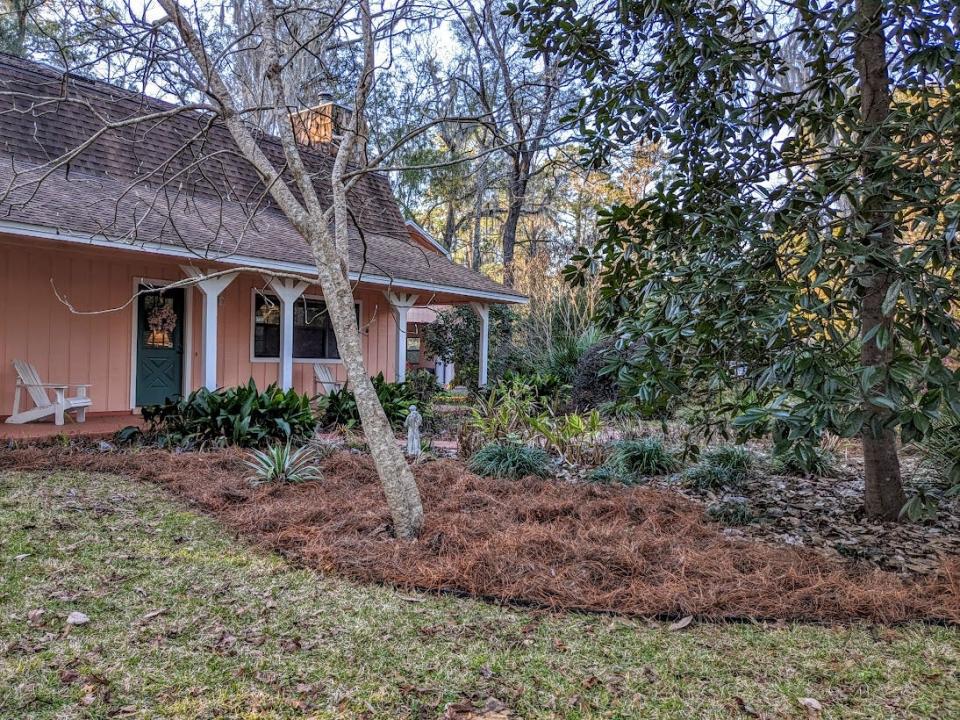Here are some ideas for using mulch to improve your garden and landscape
Every spring, we should take a look at our landscape to determine what clean-up or other preparations we need to do before the heat of the summer gets here.
Cleaning up dead plant material, leaves, or even some light pruning and fertilization will greatly improve the overall plant health.
Mulching is one of the simplest and most beneficial practices you can use in the garden. Not only does it help dramatically reduce weeds but it also protects from erosion, reduces compaction and moderates soil temperature.
A good mulching will also improve your soil over time by incorporating organic matter.
More: Crabapples are a wonderful pick for your yard, but choosing the right one is crucial
Mulch is simply a protective layer of a material that is spread on top of the soil. Mulches can be organic, such as grass clippings, straw, bark chips and similar materials, or inorganic such as stones, brick chips and plastic.
Organic mulch will also improve the condition of the soil. As these mulches slowly decompose, they provide organic matter that helps keep the soil loose. This improves root growth, increases the infiltration of the water, and also increases the water holding capacity of the soil.
Organic matter is a source of plant nutrients and provides an ideal environment for earthworms and other beneficial organisms.

You can find mulch materials in your own yard. Grass clippings make excellent mulch. Just be sure that you do not treat your lawn for weeds as the herbicide could be carried over to the plant causing damage. While grass clippings are not particularly attractive for a flower bed, they are wonderful for a vegetable garden. The fine texture allows them to be spread easily around even very small plants. Grass clippings are becoming increasingly scarce due to the popularity of mulching lawnmowers.
Newspaper works especially well to control weeds. Lay the newspaper down around the plants and wet it with a water hose to get it to lay flat. Often, newspaper will be covered with a light layer of organic mulch such as grass clippings.
Leaves are another readily available material to use as mulch. So is compost. They both offer another source for mulch and they are an excellent source of nutrition for plants.
Bark chips and composted bark mulch are available at garden centers. These look good and will eventually improve the soil. They will last from one to three years depending on the size of the bark and how well composed the bark is.
More: Here are some things you need to know about springtime blooming trees and shrubs
Numerous other materials also make great mulch such as hay, straw and pine needles.
Do not apply mulch directly in contact with plants. Leave an inch or so of space next to plants to help prevent diseases flourishing from excess humidity. Remove weeds before applying mulch.
Apply two to four inches of bark mulch and wood chips. For leaves you will need to apply approximately three to four inches and grass clippings two to three inches will work well.
Bark mulch and wood chips are often used with landscape fabric. The fabric is laid on top of the soil and then covered with a layer of wood chips or bark. A caution to this practice, while initially the fabric may provide additional protection against weeds, as the mulch breaks down, the weeds will start to grow in the mulch itself.
The barrier between the soil and the mulch also prevents any improvement in the soil condition and makes planting additional plants more difficult.
Numerous beds surrounding your home could be expensive and labor intensive to re-mulch every year. Consider using other mulch options such as grass clippings or leaves as a way to save some money.
P. Andrew Rideout is the UK Extension Agent for Horticulture and can be reached at pandrewrideout@uky.edu.
This article originally appeared on Henderson Gleaner: How should I use mulch in my landscaping and garden?

